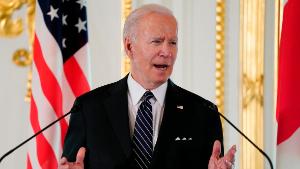Biden finds unity abroad. He's losing it at home
President Joe Biden's crusade against authoritarian leaders abroad is complicated, constantly, by the messiness of his democracy at home.
The leader who so forcefully condemns aggressors and so completely marshals the world community against Russia notoriously failed to marshal the senators he needed to enact a lasting domestic agenda.
He's bent on ensuring that the Ukrainian and Taiwanese people can choose their own leaders in free elections, but a shocking number of Republicans continue to reject his own election victory.
He sputters trying to explain a teetering economy to Americans, which could cost his party control of Congress in elections later this year.
The Senate is so paralyzed by the filibuster, which gives a minority the ability to squash legislation, that no elected leaders seem to be seriously talking about federal legislation to deal with some of the largest American problems:
American democracy is not uniform. The Supreme Court seems poised to remove the right of American women to obtain an abortion within limits. Some states, exercising their own form of democracy, are looking forward to outlawing women ending any unwanted pregnancy, even shortly after conception. Oklahoma legislators recently passed a bill that would ban abortion "from conception."
Who should Biden root for in this election? A key test of faith in US democracy comes on Tuesday in Georgia when the Republican governor and secretary of state who stood up to former President Donald Trump's attempt to overturn the 2020 election results face Republican primary voters.
Both Gov. Brian Kemp and Secretary of State Brad Raffensperger want to keep their jobs. For the governor's race, Trump has endorsed former US Sen. David Perdue, but Kemp appears to have momentum, drawing the former President's ire. Election deniers, as Politico points out, have so far failed to win primaries for secretary of state positions in Idaho and Nebraska.
The cruel irony of these primaries. The difficulty for someone like Biden is that he might prefer the Republicans who acknowledge the legitimacy of his presidency to triumph in their primaries. It arguably sends a signal of unity, however small, in a shared truth. But it may also hurt his party's prospects in November to have Republican candidates who can appeal to voters who do not reject him outright.
Abroad, Biden speaks clearly and with power. White House aides were caught off guard and immediately sought to clarify Biden's unequivocal promise to Taiwan on Monday.
"Yes," he said, the US would get involved militarily if China invades Taiwan just as Russia has invaded Ukraine.
"That's the commitment we made," Biden said during a news conference in Tokyo, standing alongside the Japanese prime minister. It's a step farther than the US has gone in helping Ukraine, which is not part of the strategic North Atlantic Treaty Organization, known as NATO.
Biden has repeated this promise multiple times in recent months, which suggests he's speaking his mind, and the aides -- who reiterated US respect for mainland China's government -- are trying to equivocate.
International relations can be hard to follow. The US appeases China by not having official diplomatic relations with the self-governing island of Taiwan, and China blocks Taiwan from being an official member of international alliances. But the US has supported Taiwan as a democracy and pledged in the 1979 Taiwan Relations Act to provide arms to help it defend itself.
A message from Biden to China. China would face American firepower -- Biden did not elaborate on how -- if it invaded Taiwan.
Standing up to authoritarian aggressors for democracies is turning into the main theme of Biden's presidency. He wants to show the world that the US form of government is better than the authoritarian version, where presidents change the rules to give themselves power for decades or for life and where they plot to seize land.
Remaking America as the leader of democracies. Biden's greatest success as President has been to marshal most of the world against Russia's invasion of Ukraine.
But at home, he faces an arduous task. The New York Times columnist Thomas Friedman emerged from a recent lunch with Biden with a heavy heart.
"Biden didn't say it in so many words, but he didn't have to," Friedman wrote. "I could hear it between the lines: He's worried that while he has reunited the West, he may not be able to reunite America."
Democracy works both ways. Friedman's larger point was that it's anyone's guess if the next US president will be such a strong backer of democracy.
The evidence suggests Biden's chance to reunite America -- if that opportunity ever actually existed and if America was ever actually united -- may have already passed. The same democracy that gave him power could soon take some away.
News Courtesy:
https://edition.cnn.com/2022/05/24/politics/biden-democracy-asia-trip-what-matters/index.html











